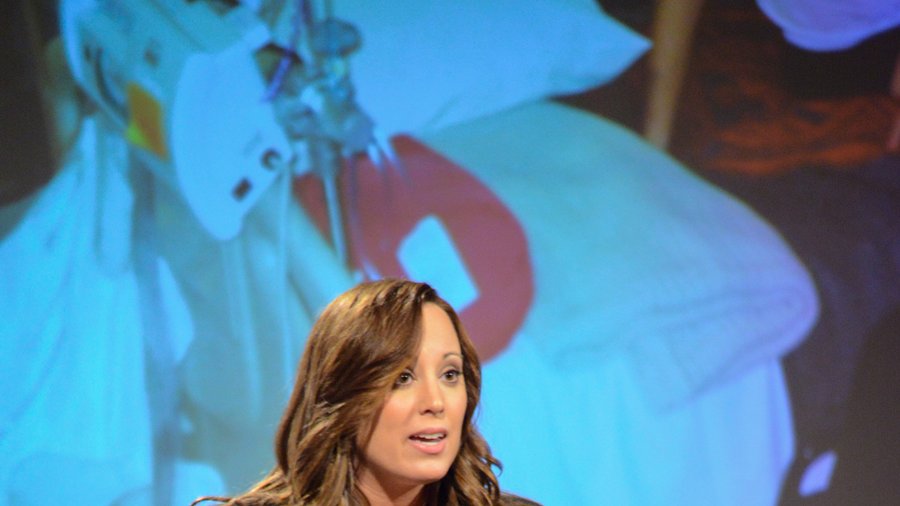Jessica Harthcock knew it was bad when her body went numb.
She was stunned and couldn't speak. But she'd heard the crunch.
"I knew I just broke my neck," Jessica said.
Jessica was a varsity springboard diver. Cross-training was encouraged, so Jessica also practiced gymnastics. And on the night of the accident, she over-rotated on a front double-tuck with a layout twist — and fractured her spine.
From the X-rays, it almost looked like the spinal cord had been pushed off to the side, she said. The prognosis was grim.
Jessica was 17 years old. And less than two months later, the former varsity athlete started her senior year of high school in a wheelchair. That's when the treatments began.
Eleven years, tens of thousands of dollars and countless cross-country trips — from the Mayo Clinic to Vanderbilt, Shriner's Children's Hospital to Frazier Rehabilitation Institute — later, Jessica can walk. And she has become one of the many entrepreneurs who saw business opportunity in their pain points.
In May 2013, Jessica co-founded Nashville-based startup Utilize Health. It's akin to OpenTable or Hotels.com but is designed to help patients with neurological disabilities find the therapies and facilities best suited to help them. And with $750,000 in angel funding from a prominent health care investor, Jessica is on her way.
'Always the dreamer'
Adam, a personal trainer working at a rehab facility, met Jessica about a year after her injury. He was tasked with helping her build up her arm strength so she could move around in a wheelchair without getting fatigued. But he was nervous: He'd never worked with someone with a disability.
"Meeting Jessica that first day, it put me right at ease," Adam said. "Her personality is so engaging and charismatic. And she was pretty good looking, too."
Within a few months, Jessica moved on to other therapists. And she and Adam began dating.
Her goal was always to walk again. "But that's because she's always the dreamer," Adam said. And yet, "she achieves the things she dreams."
It was an excruciatingly slow process over years of therapy.
"It's not like you come home one day and all of a sudden, someone is (walking)," Adam said. "Over time, it was more of a leg twitch. Then you can control it a little more. Then the leg lifts. Then it's more of a shuffle than a step. Then there's a step, but it's kind of labored."
In 2010, the summer Jessica graduated from Louisiana State University, she and Adam got married.
And Jessica walked, unassisted, down the cathedral's (very long) aisle.
Cold calls and a 'Jumpstart'
After they were married, Jessica and Adam moved to Nashville, and Jessica enrolled in a master's program at Vanderbilt University for organizational leadership. That's where a professor pushed her to consider building a company around the needs she already saw in the treatment realm.
"Throughout my recovery, I had patients all of the time call me out of the blue and say, 'Hey, you don't know me, but my cousin's friend gave me your contact information,'" Jessica recalled.
They'd ask her about her therapy, the facilities that were best, what equipment they should consider.
So in March 2013, Jessica and Adam applied to the well-known Nashville accelerator program Jumpstart Foundery, hoping to tap the expertise of the advisers and to take their socially conscious business idea, Utilize Health, to the next level.
'I know this stuff'
David Ledgerwood helped a lot with that.
Affectionately known as "Ledge," Ledgerwood was an accomplished entrepreneur and the head of Jumpstart Foundery at the time. He met with Jessica when he heard she was interested in applying. He liked her story and her idea to connect patients with the facilities they need.
But to be admitted to Jumpstart, he said, Jessica needed a discernible revenue model. She didn't want to make most of the company's money on patients, so he encouraged the company to create a model that would allow them to bring in most of their revenue from facilities who pay to have detailed profiles of their services on the Utilize Health site.
That means patients can use Utilize Health's matching service for free and can pay a monthly subscription rate for additional services (a 3-month subscription is $79.99 a month, a six-month subscription is $59.99 per month, and a full year is $49.99). Those services include locating housing, filing appeals to insurance companies and even arranging for prescriptions.
"Jessica is the entrepreneur we always want to pull for," Ledgerwood said. "This woman has some kind of crazy tenacity to keep going after this thing, where a lot of people are going, 'This is never going to work.'
"And she made it," he continued. "She earned that (funding) by being strong and sticking to it, and saying, 'No, dammit, I know this stuff.'"
Harthcock hopes Utilize Health can move beyond neurological disabilities and encompass more health problems, more situations where patients don't know where to turn. Their next avenue could be autism, she says. And within five years, she hopes to have a presence in 11 markets around the U.S.
"We have people screaming for help," Jessica said. And now she and her trainer-turned-husband are ready to answer.
For more from Bizwomen.com, sign up for our free email newsletter.






